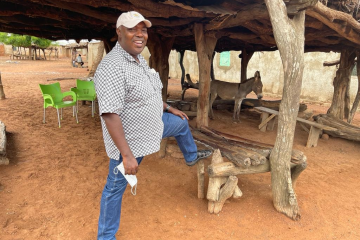
Affiliate Spotlight: Monica Martinez-Bravo on advancing evidence use in Spanish policymaking

Monica Martinez-Bravo is an associate professor at the Center for Monetary and Financial Studies (CEMFI) in Madrid, Spain. Her research interests lie at the intersection of political economy and economic development.
Raised by parents who grew up in rural Spain, Monica Martinez-Bravo came to understand the pervasive nature of poverty, even at a time when technology and industry were quickly advancing. “In the 1940s and 50s, a majority of the Spanish population was in dire poverty,” Monica says. “It’s unthinkable that, today, so many people around the world still live under those circumstances. That drew me to development economics.” Now an associate professor at CEMFI, Monica aims to uncover how political systems can impact the economic outcomes of the poor, largely focusing her research on the political economy of development.
For Monica, understanding both economics and politics is vital for making sense of the world today. Early in her career, while conducting research on village leadership in Indonesia, she noticed how failures in political systems could often contribute to economic failures. While much of her research on political economy continued to take place in Indonesia, during the pandemic Monica began to look toward her home country of Spain.
When the Covid-19 pandemic began, Monica was concerned with how uncertainty around the Spanish government’s policy responses to the pandemic could erode public trust in the political system. She hypothesized that if populations thought the government was mismanaging the crisis, they might be less willing to comply with safety regulations, like vaccination.
To test this, Monica and her team ran an online experiment in which they provided randomly selected study participants information on the number of contact tracers in their region. According to the study, people often overestimated the number of contact tracers—when they were informed of the real number, their perception of the government’s handling of the pandemic worsened.
Monica also discovered that the participants assigned blame for this perceived mismanagement depending on their political alignment. For example, if an individual’s preferred political party was at the helm of the regional government, they would be more likely to blame the central government for the inadequate number of contact tracers, and vice versa. This blame-shifting effect hinders the ability of citizens to keep their politicians accountable. In regions where regional and central governments were ruled by different parties, and hence blame-shifting was possible, the mismanagement of the pandemic did not translate into a reduction in electoral support for incumbent politicians.
This study is just one example of how Monica is using randomized evaluations to better understand policies that can improve social and economic conditions for people in Spain. A recent J-PAL Europe partnership with CEMFI and the Spanish Ministry of Inclusion, Social Security, and Migration (MISSM) has been pivotal to reaching this goal. After learning that MISSM was dedicating European Union funds toward conducting randomized evaluations, Monica approached the Spanish government and offered research support. The partnership has already helped guide and implement 34 RCTs that are in the process of being conducted.
“It’s very unprecedented in the Spanish setting to first, run randomized controlled trials (RCTs), and second, to run them with such a close partnership between researchers and the public sector,” Monica says. “While running RCTs in a new government setting isn’t without its challenges, I know the partnership is opening doors for future, high-level RCT work.”
To Monica, this partnership will have an impact beyond the individual studies. She sees it as the linchpin to the future of evidence use in Spanish policymaking, as well as a template for the types of dialogues that can exist between governments and academics, both in and outside of Spain. As the partnership continues Monica is already looking ahead to future collaborations, especially related to social inclusion policies, like lowering bureaucratic barriers in domestic violence cases and in the immigration process.
Throughout her career, Monica has become convinced of the potential for the field of economics to enable real change in people’s lives.
“I think there are lots of really interesting questions out there about how the world works, but sometimes you can get a little bit frustrated about the time we spend thinking about ideas and not having an impact in the world in the next five, ten years,” Monica says. Out of this frustration, she has chosen to center her research on policy changes that can have the potential to help people in the medium-run. Monica sees her recent selection as a J-PAL affiliated professor as a way to ramp up her work helping inform evidence-based policy. “I think it’s important to make our profession helpful to the world today, not just in a hypothetical or long-term way.”
Monica has been a J-PAL affiliate since 2022. For more information about Monica and her research, visit https://www.povertyactionlab.org/person/martinez-bravo.



